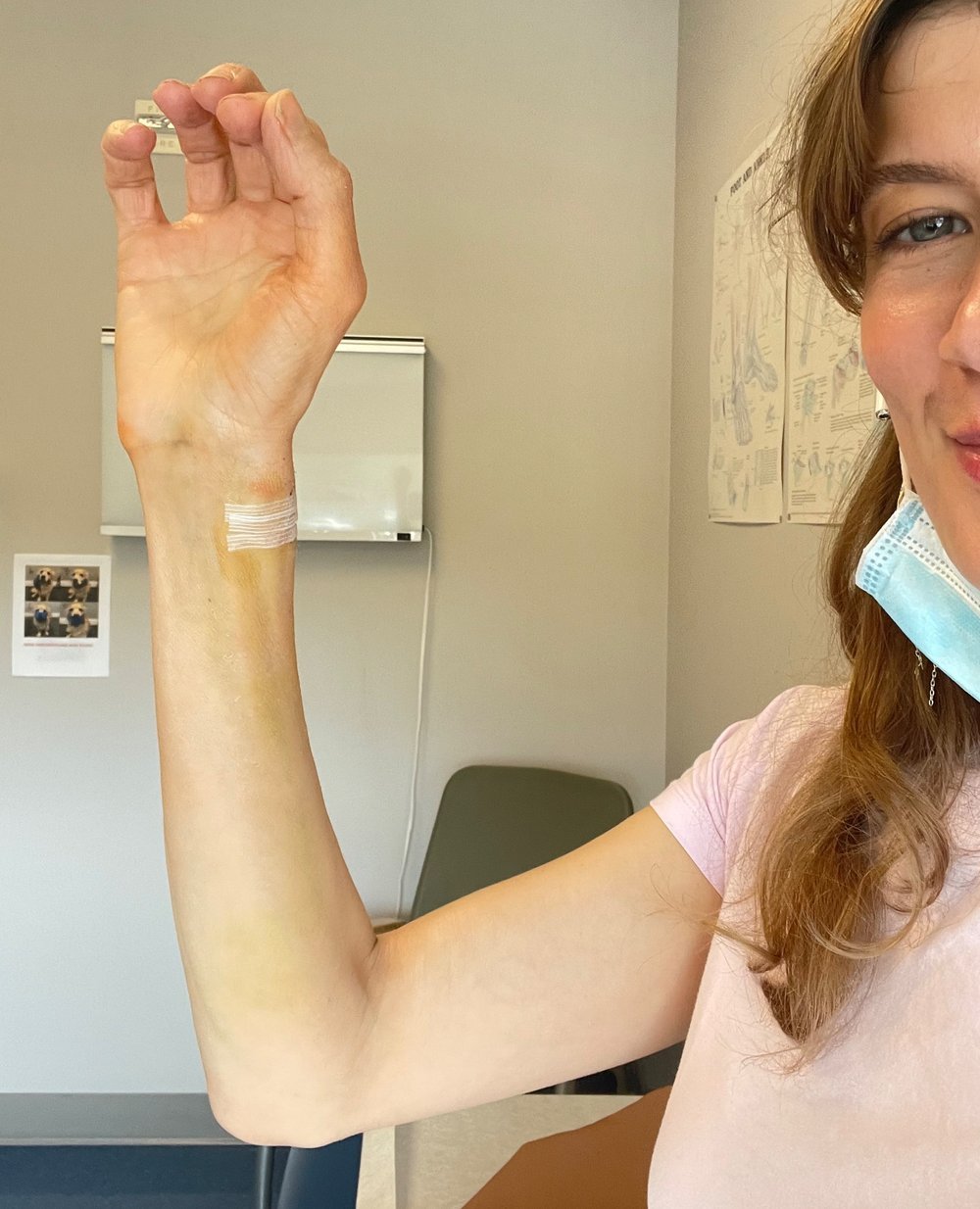I reject that an injury has to be your permanent reality.
Oh hi! It’s 6:45 am and I’m about to head Into surgery. The nurse literally just asked, “So. Is this your first surgery with us?” which seems to be the surgery small-talk equivalent of “come here often?”
I had surgery on my dominant wrist in February of this year (I just checked my calendar and apparently it’s still 2022). It was something I avoided for as long as possible because I really believed I could heal myself through physical therapy, regular use of my TENS unit (a machine that stimulates nerves), and my ride-or-die Epsom salt soaks (which totally work! Except when they don’t.).
But after 12 months of pain with zero improvement, I finally went to see a surgeon (and pain is all relative after you’ve birthed a child, amirite?, so what I now consider painful is significantly skewed). He said surgery was pretty much my only option because the ultrasound revealed I had an extra compartment in my tendons, a somewhat rare genetic occurrence that would prevent me from regaining full use of my wrist. Not to mention the fact that my tendon looked like frayed rope and my nerves were covered in scar tissue.
So with that, I finally accepted reality and got the surgery, which they scheduled ASAP.
The surgeon (shoutout to Dr. Hamilton at Sports Medicine Oregon!) told me my case was in the top ten worst he’d ever seen, but that I should heal within six weeks. Sure enough, it did. My wrist is 100% at this point, just 6 months later. (And with only a small, but prominent scar to remind me, which doesn’t bother me one bit.)
I’m telling you this for a few reasons:
There’s no great lesson here, but I so refused to identify with my injury (which is something I preach—“Don’t identify with your injuries—believe that you’ll heal”) that it was ultimately counterproductive. I could have cut the pain by 6 months had I had surgery sooner rather than later, but I was stubborn.
When do you accept that it’s time to try a different route? Perhaps that’s the metaphor right there. Patience is key and anything worth building (or repairing) takes time, but you’ve also got to recognize when to try plan b. My girlfriend in DC spent years trying to rehab her knee through PRP injections, a bunch of other crap that didn’t work, and ultimately surgery, which still didn’t work. After all that, she found a kickass PT and spent a full calendar year in intense physical therapy and now? She’s running up (and down!) stairs and living her life like it’s pre-injury. For me, however, a year of PT just revealed that things were getting worse.
As my friend Jessica Brinson points out, just because you’re injured in one extremity doesn’t mean you don’t have to exercise your three others plus the rest of your body. Further, when you’re injured and pissed about it (Oh hiii there! That’s me I’m talking about), you might focus on all the things you can’t do, but that’s a delay tactic in getting on with your life. Focus on what you CAN do. Thanks for pointing this out, Jess. She also stresses that this applies to being pregnant, too. Amen.
Oh, and she says she can totally see how athletes can sink into deep depression with an injury. It feels permanent. It feels dominant. But you have to believe there is a solution out there.
Last thing. If you have an injury, ask yourself if you believe you’re going to get better or if you’re in a downward spiral heading to the darkside where you’re either attached to your injury as part of your identify OR you believe that this is just your new reality. I’m talking about chronic sufferers here. If you’ve had neck pain for 15 years or a bad knee since high school, perhaps it’s time to examine why that is.
I had neck pain on my left side for 11 years, from age 20-31. I thought it was permanent and just a part of who I was. Wrong. I started exercising consistently for the first time in my life at 30, found Feldenkrais (a somatic movement method that reorganizes connections between the brain and body), and this is the hard part: I stopped working at a desk full-time. With that combination, it’s been another almost 11 years of no pain.
A serious injury can be demoralizing (been there!), but it’s not your permanent reality. Human bodies can make a lot of progress over a lifetime. They get stronger. And they (our bodies!) can continue to age better, function better, and generally live better if we think of ourselves as a project. The more we put into the project, the more we get out in the long run.
One week out, cast just off.
- Meegan


